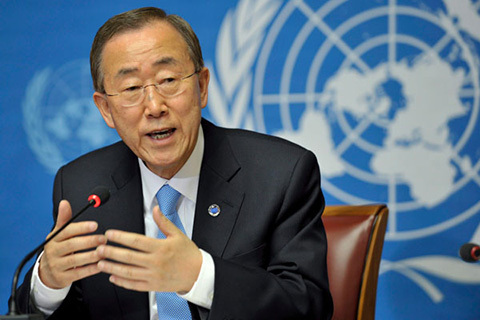The National Security Advisor-level talks between India and Pakistan—which have now been called off—put a fresh spotlight on Kashmir, after the recent issue of killings along the Line of Control in Jammu and Kashmir.
 While the US urged India and Pakistan to resolve all bilateral issues, including “disputed” Kashmir, in a direct manner and come up with a “common approach to resolve them”, the UN chief asked both nations to “address their differences through dialogue.”
While the US urged India and Pakistan to resolve all bilateral issues, including “disputed” Kashmir, in a direct manner and come up with a “common approach to resolve them”, the UN chief asked both nations to “address their differences through dialogue.”
‘KASHMIR A DISPUTE’
On Thursday, few days before the scheduled NSA talks in New Delhi—which were called off by Pakistan yesterday—the United States hoped of a successful dialogue between the NSAs of the two countries. It also asserted that Kashmir is a disputed territory and it is for the governments of India and Pakistan to solve the dispute. A White House official told the Press Trust of India: “Kashmir is a disputed territory. Jammu and Kashmir is a disputed territory. I think, it’s up to them to address these issues together. I expect that they probably will.”
Peter R Lavoy, Special Assistant to the president and Senior Director for South Asian Affairs at the National Security Council of the White House, said: “There is no change on the US position on Jammu and Kashmir. We do acknowledge that this is a contested territory, a contested border between India and Pakistan. There is no change in US policy on that issue. We do not seek to insert ourselves in this process.”
The US hoped that the two national security advisors would address all bilateral issues, including “disputed” Kashmir, in a direct manner and come up with a common approach to resolve them.
‘DANGEROUS FLASH POINT’
In the wake of recent firing along borders in Jammu and Kashmir, The New York Times board wrote an editorial titled “The Need For Restraint in Kashmir” on August 19. The editorial explicitly mentioned that “the disputed region of Kashmir remains a dangerous flash point more than 50 years after India and Pakistan were created in the partition of the British colonial empire.”
“Cross-border violence has surged in recent months, raising new fears that the attacks could spiral out of control and set off another war between the two nuclear-armed adversaries,” the editorial mentioned.
“In a sign of heightened concern over Kashmir, the United States and the United Nations secretary general, Ban Ki-moon, have urged India and Pakistan to exercise restraint and solve their differences through dialogue. They will have a chance to heed that advice when top Indian and Pakistani national security advisers meet later this month,” it concluded.
UN STEPS IN
UN Secretary-General Ban Ki-moon also asked India and Pakistan to exercise “maximum restraint” in the wake of increased tensions along the Line of Control and hoped that talks between the National Security Advisors of both sides will result in a “positive outcome.”
“The Secretary-General calls upon the Governments of India and Pakistan to exercise maximum restraint and take all feasible steps to ensure the protection of civilians,” Ban said in a statement few days ago, reiterating his call for both nations to address their differences through dialogue.
The UN chief welcomed NSA-level talks between the two countries and expressed hope that the meeting will lead to a positive result.
“The Secretary-General urges both countries to continue to address their differences through dialogue. In that regard, he welcomes the planned meeting between their respective NSAs on 23-24 August, and expresses the hope that it will lead to positive outcomes,” the statement said.
‘FOCUS ON PM MODI’
According to analysts, there has been a clear focus of international players, particularly the US as also a section of international media, on Kashmir especially in the wake of rise of Narendra Modi as the Prime Minister of India in May 2014.
“It is very clear that the international community is watching Kashmir with a renewed focus, especially after Modi’s rise as the PM. But it has also to do with Pakistan’s repeated attempts to internationalize Kashmir issue by raising it at the international forums,” he said.
On August 19—just before scheduled NSA-level talks—Pakistan raised the Kashmir issue at the UN Security Council, seeking mediation from the world body and the Organisation of Islamic Cooperation to resolve the issue.
Speaking during an open debate on the subject of regional organisations and contemporary global security challenges on Tuesday, Pakistan’s permanent representative to the UN Maleeha Lodhi said the 57-member OIC can also contribute to the promotion of global peace and prosperity.
“Collectively, and in cooperation with the UN, it has the capabilities to address and overcome these challenges including Palestine and other Middle East conflicts as well as the Jammu and Kashmir dispute,” she told the 15-member Council.
Pertinently, the NYT editorial cited above wrote: “…India, which is considerably stronger and more successful than Pakistan, has the most to lose if another war erupts. Mr. Modi recently became the first Indian prime minister in 34 years to visit the United Arab Emirates, which had been one of Pakistan’s biggest supporters but now sees the value in closer ties with India. In a joint statement, India and the emirates condemned the use of religion to justify terrorism and agreed to cooperate in counterterrorism operations.”




